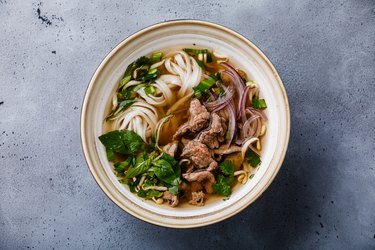
Pho, pronounced "fuh," is a popular soup in Vietnamese restaurants throughout the country. Pho nutrition is high as the soup consists of noodles, basil, peppers, bean sprouts, lime and often a meat such as beef or chicken. Pho calories vary though, depending on your serving size and protein choice.
Tip
Pho calories can vary widely depending on your protein preference, serving size and restaurant choice if you don’t make the soup yourself. You can consume anywhere from 10 calories for pho broth to 219 calories for chicken pho soup with rice noodles.
Video of the Day
Video of the Day
Pho Calories
According to the USDA, pho calories vary depending on your pho of choice:
For anyone wishing to eschew the vegetables and protein, you can opt for pho broth as a healthy, low-calorie soup. Pho broth contains just under 10 calories per 1 cup and includes healthy ingredients such as kelp stock, onion puree, organic ginger juice, coriander, cinnamon and cloves. The broth will provide you with 27 milligrams of potassium to help you regulate your hydration levels and 4.9 milligrams of calcium to build healthy bones. You will also consume 32 percent of your recommended daily value of sodium with one serving.
A half a bowl (30 grams) of mushroom Vietnamese pho has 110 calories and includes ingredients such as rice noodles, mushroom and fish powder and vegetables such as mushrooms, carrots and green onions. You'll consume 22 grams of carbs in pho and 910 milligrams of sodium, which amounts to 39 percent of your recommended daily value.
Vegetarians can enjoy the meatless vegetable Vietnamese pho, which in 1.6 ounces, delivers 160 calories, 3 grams of protein, 2 grams of total lipid fats, just under 1 gram of fiber, 32 grams of carbs and 780 milligrams of sodium — 33 percent of your recommended daily value. The pho's ingredients are rice noodles, fish powder, celery and onion for the vegetables, garlic, chili, star anise and green onion oil.
Anyone wanting a little more protein in their pho can try chicken pho soup, which has 219 calories per bowl (228 grams). This serving size includes 17 grams of protein, just under 4 grams of total lipid fats, 31 grams of carbs, 20.5 milligrams of calcium and 980 milligrams of sodium — 41 percent of your recommended daily value. The soup is made with chicken broth, rice noodles, chicken, mung bean sprouts, onion, spices, cilantro and green onion.
Health Benefits of Pho
Although you should eat pho in moderation because of its high sodium content, the soup does offer health benefits because of its broth, rice noodles, vegetables and lean proteins. Such health benefits include the following:
If you eat pho with rice noodles, you can help reach your recommended daily manganese intake. Manganese helps activate enzymes that protect your cells from DNA damage. In an April 2018 review published in Oxidative Medicine and Cellular Longevity, researchers found that manganese also aided in relieving oxidative stress and preventing metabolic diseases, a group of conditions that can elevate your risk of a heart attack or stroke.
For the pho meat eater, the chicken bone broth can contain high levels of protein. In a November 2017 study from the Journal of Renal Nutrition, the author found that bone broth offers more protein than the average cup of basic chicken broth. The study also states that Paleo diet followers can also eat drink this broth, as its Paleo-friendly.
- United States Department of Agriculture: “Pho Broth”
- United States Department of Agriculture: “Mushroom Vietnamese Pho”
- United States Department of Agriculture:"Vegetable Vietnamese Pho"
- United States Department of Agriculture: "Chicken Pho Soup"
- Oxidative Medicine and Cellular Longevity: "The Essential Element Manganese, Oxidative Stress, and Metabolic Diseases: Links and Interactions"
- Journal of Renal Nutrition: "A Sip Above the Rest…Is Bone Broth All Its Boiled up to Be?"